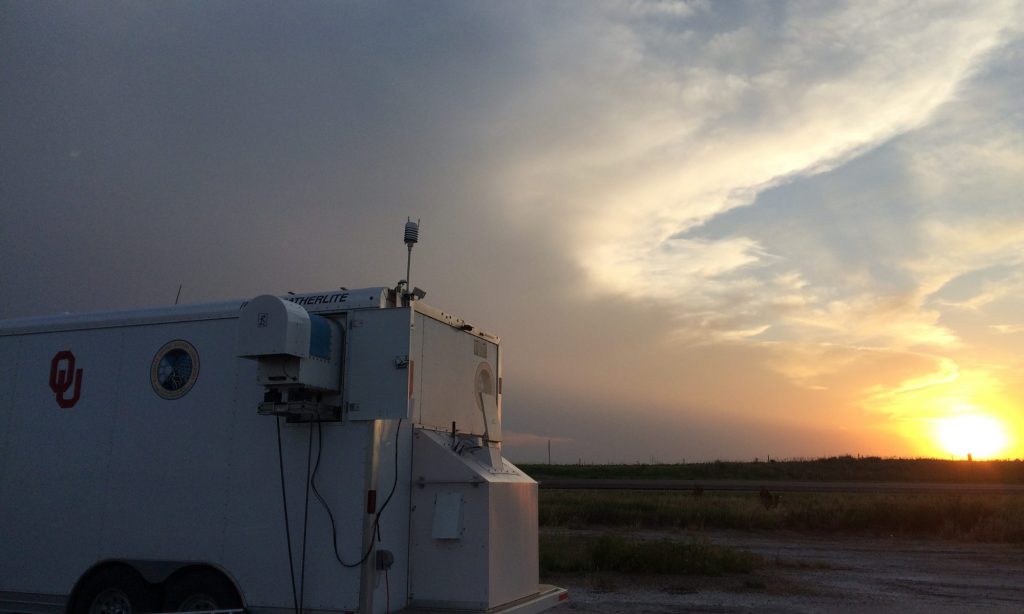collecting and applying state-of-the-art observations to research
THE ATMOSPHERE IS OUR LABORATORY
No matter the specific focus, atmospheric research nearly always requires the use of meteorological observations. The researcher benefits from understanding the theory and methods behind observation collection and important steps in data processing and application. This course will examine the observation and operation principles behind a variety of research-grade instruments There will be no exams, with focus instead on group instruction, guest lectures, instrument demonstrations, and data-focused exercises and projects. Material presented will focus on modern and state-of-the-art instruments applied to current research problems. Students will use Python for processing, analysis, and visualization of real observed datasets, helping prepare students for research careers.
Welcome to the course site!
In past offerings, we have used a hybrid approach*. The office canvas site is the place to find course content and materials! This page is a hosting location to share materials beyond the class. At present it reflects FA2021 material.
Get started by checking out the course syllabus for information, policies, and a summary list of course activities (at the bottom).
Course Instructors:
Dr. Elizabeth Smith (she/her)
Dr. Petra Klein (she/her)
Dr. Tyler Bell (he/him)
Dr. Liz Pillar-Little (she/her)
Land Acknowledgment Statement
Long before the University of Oklahoma was established, the land on which the University now resides was the traditional home of the “Hasinais” Caddo Nation and “Kirikirʔi:s (Links to an external site.)” Wichita & Affiliated Tribes.
We acknowledge this territory once also served as a hunting ground, trade exchange point, and migration route for the Apache, Comanche, Kiowa and Osage nations.
Today, 39 tribal nations dwell in the state of Oklahoma as a result of settler and colonial policies that were designed to assimilate Native people.
The University of Oklahoma recognizes the historical connection our university has with its indigenous community. We acknowledge, honor and respect the diverse Indigenous peoples connected to this land. We fully recognize, support and advocate for the sovereign rights of all of Oklahoma’s 39 tribal nations. This acknowledgement is aligned with our university’s core value of creating a diverse and inclusive community. It is an institutional responsibility to recognize and acknowledge the people, culture and history that make up our entire OU Community.
Course Topics
Resources for Python and LaTex can be found here.
| Date Range | Topic — Click for Navigation | Instructor |
| Entire Semester | Project Information | All |
| 23 Aug – 20 Sept | Introduction and Overview Topics | E. Smith, P. Klein, T. Bell |
| 22 Sept – 4 Oct | Flux Measurement and Processing | P. Klein |
| 6 Oct – 18 Oct | Kinematic Profiling | E. Smith |
| 13 Oct – 25 Oct | Thermodynamic Profiling | E. Smith |
| 27 Oct – 3 Nov | Thermodynamic Retrievals | T. Bell |
| 10 Nov – 22 Nov | UAS Methods for Meteorology and Atmos. Chem. [modified here as WxUAS] | T. Bell, E. Pillar-Little |
Course Exercises
*Hybrid course content is delivered online. If adequate connectivity or access is or becomes an issue at anytime throughout the semester, contact any member of your instructor team. COVID19 and the conditions it puts us in brings unforeseen challenges for all of us. No one should get less out of this class experience due to access or connectivity challenges.

